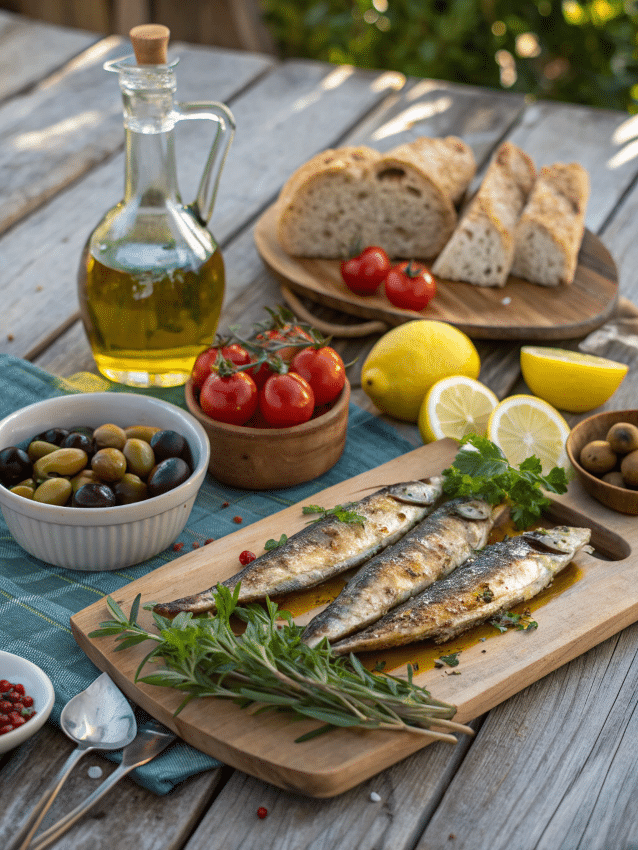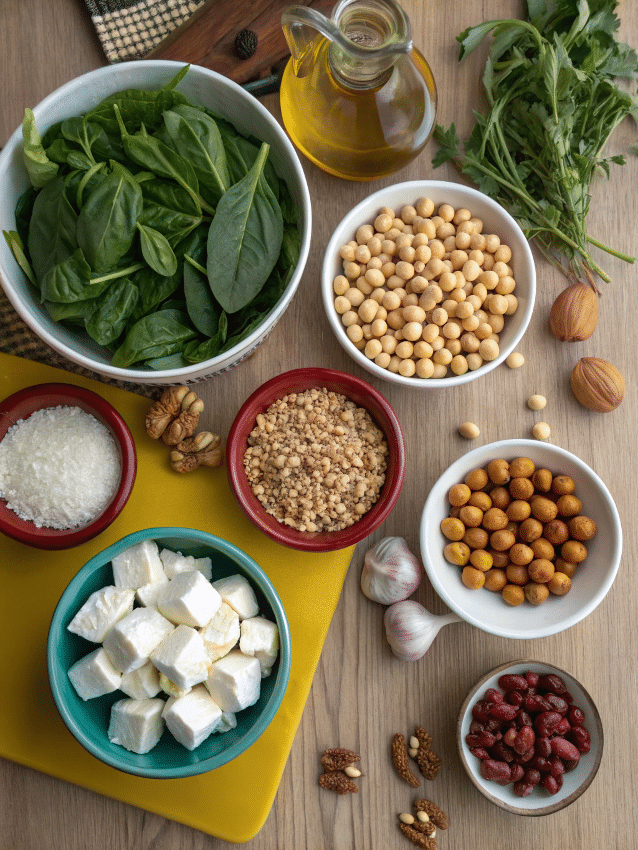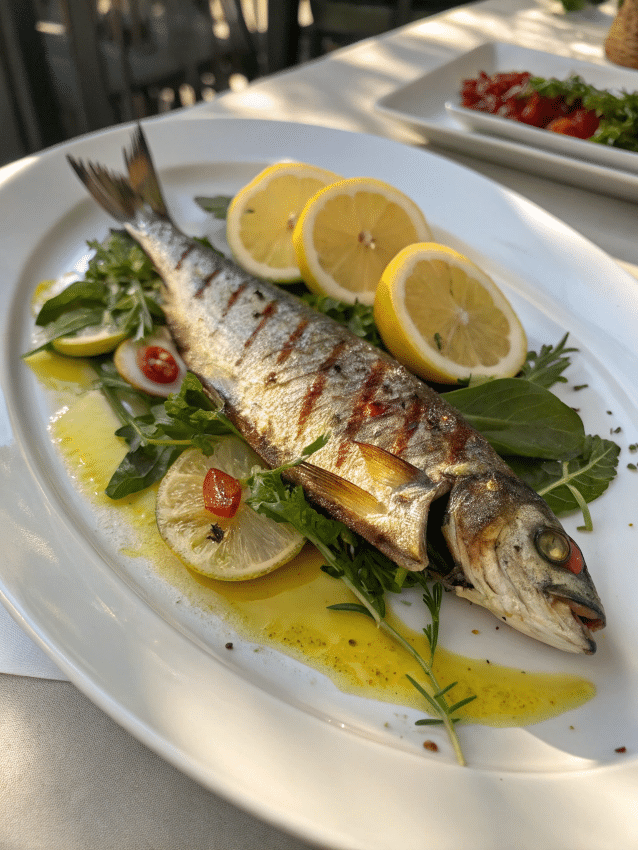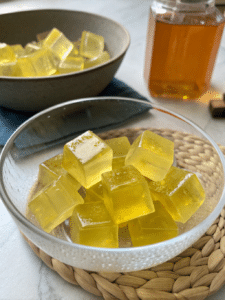
What is the Mediterranean diet, and why has it stood the test of time? More than a trend, this vibrant eating style draws from the traditional foods and habits of countries bordering the Mediterranean Sea. With its focus on fruits, vegetables, olive oil, seafood, and community-centered meals, it’s not only one of the most studied but also one of the most sustainable diets. In this guide, you’ll discover the heart of the Mediterranean lifestyle, what to eat (and avoid), tips for getting started, and how it can support your health, no matter where you live.
In this Article
Key Takeaways: What You Need to Know About What Is the Mediterranean Diet
- What is the Mediterranean diet? It’s a flexible, heart-healthy way of eating inspired by traditional lifestyles in countries like Greece, Italy, and Spain.
- Core foods include vegetables, fruits, whole grains, legumes, seafood, nuts, seeds, and olive oil.
- Dairy and meat are eaten in moderation, fish is favored over red meat, and sweets are rare.
- It’s not a fad. Backed by decades of research, it lowers risk of heart disease, supports brain health, and helps with weight management.
- Easy to follow with everyday ingredients, no calorie counting, and no strict rules, just real food, real flavor, and real results.
A Simple Life, A Better Plate
My Journey into the Mediterranean Lifestyle
Hi, I’m Deen – welcome! I’m a self-taught home cook living just outside Asheville, North Carolina. My love for cooking really began in my twenties, during a messy season of life when takeout and cereal were more common than vegetables. One night, after a long shift and an empty fridge, I pan-fried some olive oil with garlic, tomatoes, and canned chickpeas. That quick, warm meal changed everything. I didn’t know it at the time, but I was cooking my first dish that reflected what is the Mediterranean diet at its core, simple, nourishing, and flavorful.
What drew me in wasn’t just the flavor, it was how good it made me feel afterward. Not heavy, not sluggish. Just…right. And that’s exactly what is the Mediterranean diet all about: wholesome ingredients that fuel your body while making cooking feel joyful instead of stressful.
Now, my kitchen is filled with earthy herbs, good olive oil, and easy recipes from across the Mediterranean, Greece, Italy, Morocco, and beyond. To me, what is the Mediterranean diet isn’t about perfection or restriction. It’s about building meals around fresh, real, satisfying foods. I’ve learned how to make what is the Mediterranean diet work right here in my Southern kitchen, and you can too.
Whether you’re here to support heart health, manage weight, or just eat better without giving up flavor, discovering what is the Mediterranean diet can change the way you approach food. So, let’s take this one bite at a time.
You can find lots of beginner-friendly meals in my Mediterranean Diet Recipes collection or start with a structured Mediterranean Diet Meal Plan if you want step-by-step guidance.
What the Mediterranean Diet Really Is
Core Principles of the Mediterranean Diet
So, what is the Mediterranean diet at its core? It’s not just a list of foods, it’s a lifestyle deeply rooted in balance, community, and natural nourishment. Originating from the coastal regions of Greece, Italy, and southern Spain, the Mediterranean diet emphasizes whole, minimally processed foods that have fueled generations of long-living, healthy people.
The foundation includes fresh fruits and vegetables, legumes, whole grains, olive oil, nuts, and seeds. Seafood and fish are favored over red meat, and dairy is eaten in moderation, often in the form of plain yogurt or aged cheese. Herbs and spices replace salt for flavor. Meals are often shared with family or friends, reinforcing connection, a major part of what makes the Mediterranean diet sustainable for life.
But what truly sets the Mediterranean diet apart is that it’s not about strict calorie counting or forbidden foods. It’s about consistency and quality. You’ll eat real food, mostly plants, and enjoy every bite.
In practice, following the Mediterranean diet means filling your plate with colorful, fresh ingredients and preparing them simply. Think lentil soups, grilled fish with lemon and herbs, hearty salads with feta and olives, or a slice of whole grain bread dipped in extra virgin olive oil. It’s satisfying, flavorful, and deeply nourishing.
You’ll find lots of helpful recipes and tips in my Mediterranean Diet overview or check out this Pink Salt Diet Recipe that’s also Mediterranean-friendly.
Misconceptions and Myths
There’s a lot of confusion around what the Mediterranean diet actually is. Some people assume it’s all pasta and cheese, probably because of its Italian roots. Others think it’s expensive, hard to follow, or only for vegans.
Let’s clear that up. First, yes, pasta can be part of the Mediterranean diet, but it’s usually whole grain and served in smaller portions alongside vegetables or fish. Dairy like cheese or Greek yogurt is included but isn’t the main focus. And while fresh produce is encouraged, frozen vegetables and canned beans are absolutely acceptable, perfect for busy home cooks like us.
Another common myth: that the Mediterranean diet means giving up meat entirely. Not true. It just means eating more plant-based meals and swapping red meat for fish or poultry when possible.
Lastly, many think this way of eating is too pricey. But the truth is, it’s flexible. You can build delicious, affordable meals using pantry staples like lentils, rice, and seasonal veggies. Start small and adapt it to your routine.
For more myth-busting and food breakdowns, visit the Mediterranean Diet Food List on my site, it’s an easy guide for any skill level.
What to Eat and Avoid on the Mediterranean Diet

Mediterranean Diet Food List Breakdown
When people ask, what is the Mediterranean diet, one of the first things they want to know is: what can I eat? The beauty of this eating style is how simple and accessible the core ingredients are. It’s not about strange superfoods or restrictive rules, it’s about everyday, whole foods that nourish you from the inside out.
Here’s a quick look at the Mediterranean diet food list, broken into the major categories:
| Food Group | What to Include |
|---|---|
| Vegetables | Tomatoes, spinach, eggplant, zucchini, leafy greens |
| Fruits | Berries, citrus, apples, grapes, figs |
| Whole Grains | Brown rice, quinoa, oats, barley, whole wheat bread |
| Healthy Fats | Extra virgin olive oil, nuts, seeds, avocado |
| Protein | Fish, seafood, legumes, eggs, moderate poultry |
| Dairy | Greek yogurt, feta cheese, aged cheese in moderation |
If you’re starting to adopt this way of eating, check out my Mediterranean Diet Meal Plan for ready-to-follow ideas.
The Mediterranean diet isn’t a fadc, it’s a flexible blueprint for eating well. That’s why it’s consistently ranked as one of the healthiest ways to eat by both the USDA and nutrition experts globally.
What Not to Eat (and Why)
Now that we’ve defined what the Mediterranean diet includes, let’s talk about what it doesn’t. Understanding what to avoid is just as important as knowing what to embrace.
If you’re wondering what is the Mediterranean diet doing differently from standard Western eating, it comes down to removing what harms our bodies most: overly processed foods, excess sugar, and unhealthy fats.
Here’s what the Mediterranean diet avoids:
- Processed meats: like bacon, sausage, deli meats
- Refined grains: white bread, white rice, pastries
- Sugary snacks and drinks: soda, candy, packaged desserts
- Fried foods: especially those cooked in seed oils
- Highly processed convenience meals
- Excess red meat
Instead of eliminating all indulgence, the Mediterranean diet simply shifts the focus. Red meat might appear once or twice a month. Sweets become a once-in-a-while treat, not a daily habit.
And yes, this includes processed versions of “healthy” items. For example, a protein bar with additives wouldn’t align with what the Mediterranean diet encourages. But a handful of almonds or a small bowl of hummus? Perfect.
I dive deeper into clean swaps and smart grocery tips on my Natural Mounjaro Recipe for Weight Loss article, which can work well alongside Mediterranean principles.
Want a deeper guide? The full Mediterranean Diet Food List breaks it all down for easy reference.
Sample Meals and Meal Planning
Typical Mediterranean Meals (Including Breakfast)
To truly understand what is the Mediterranean diet, you have to look at what people in the Mediterranean region actually eat every day. It’s not just the ingredients, it’s how meals are built, shared, and enjoyed. Mediterranean eating is rooted in variety, simplicity, and balance, starting first thing in the morning.
So, what does a Mediterranean breakfast look like? It’s typically light but nourishing. A common start might include:
- Greek yogurt with fresh fruit and walnuts
- A slice of whole grain bread with olive oil and tomato
- Hard-boiled eggs with cucumbers and olives
- Herbal tea or black coffee, rarely with sugar
Lunches are often the heartiest meals of the day. A grain bowl topped with grilled vegetables, chickpeas, and a lemon-tahini dressing is a perfect example. Or maybe a lentil soup served with crusty bread and a simple cucumber salad. Dinners are usually lighter, perhaps grilled fish with steamed greens and a drizzle of olive oil.
Unlike restrictive diets, what is the Mediterranean diet doing is creating flexibility. It encourages colorful, whole-food meals that satisfy without excess. You’ll feel full, not heavy. Energized, not bloated.
If you’re just getting started, I recommend exploring this Mediterranean Diet Recipes collection, it’s packed with accessible dishes that don’t require fancy techniques.
For a lighter option, my Celtic Salt Trick also works well as a Mediterranean-friendly side to many meals.
Building a Simple Weekly Meal Plan
So, how do you turn all this knowledge into daily action? If you’re still asking what is the Mediterranean diet and how to live it out every day, a basic weekly meal plan is a great way to begin.
Here’s a Mediterranean-style starter plan:
- Monday:
- Breakfast: Greek yogurt, berries, flax
- Lunch: Farro salad with roasted veggies
- Dinner: Grilled salmon with sautéed spinach
- Tuesday:
- Breakfast: Avocado toast with poached egg
- Lunch: Lentil soup + whole grain bread
- Dinner: Stuffed bell peppers with quinoa & herbs
- Wednesday:
- Breakfast: Cottage cheese, figs, pistachios
- Lunch: Tuna and white bean salad
- Dinner: Chicken souvlaki with tabbouleh
Each day, meals are centered around plant-forward ingredients, healthy fats like olive oil, and lean proteins. Snacks might include a handful of almonds, fresh fruit, or a few olives. It’s flexible, satisfying, and totally customizable.
One of the best parts of following the Mediterranean diet is that it doesn’t feel like dieting. If you’re still wondering what is the Mediterranean diet offering long-term, the answer is freedom, freedom to eat well without being ruled by rules.
To keep your plan going strong, grab the Mediterranean Diet Meal Plan, designed for beginners and seasoned home cooks alike.
Science-Backed Health Benefits of the Mediterranean Diet
Why Doctors Recommend the Mediterranean Diet
When asking what is the Mediterranean diet, it’s important to understand that it’s not just another trendy eating plan, it’s a scientifically backed nutritional lifestyle. Decades of global research have shown that this diet can reduce the risk of chronic diseases, improve longevity, and support long-term wellness.
The Mediterranean diet has consistently ranked as the #1 best overall diet by health organizations like the Mayo Clinic and U.S. News & World Report. But what makes it so effective? It’s the combination of nutrient-dense foods, anti-inflammatory ingredients, and sustainable habits that promote heart and brain health.
According to the National Institutes of Health, the Mediterranean diet reduces the risk of heart disease by lowering LDL (bad) cholesterol while increasing HDL (good) cholesterol. It also helps manage blood sugar levels, which is why it’s often recommended for people with type 2 diabetes or metabolic syndrome.
If you’re still wondering what is the Mediterranean diet doing differently, it’s that it encourages natural food, not processed shortcuts. The result is a balanced way of eating that’s both preventative and healing.
Need proof? In regions where this way of eating originates, such as Sardinia and Ikaria, people live longer, healthier lives, many into their 90s and beyond. These “Blue Zones” share one thing: they eat in a way that aligns with the Mediterranean diet.
Explore even more about these habits and recipe ideas in my Mediterranean Diet guide and my simple Gelatin Trick Recipe, which fits well within this lifestyle.
Heart, Brain, and Weight Loss Benefits
Now, let’s dig into how what is the Mediterranean diet really means for your body, starting with your heart. Studies have shown that this eating pattern significantly reduces the risk of heart attacks, strokes, and high blood pressure.
This diet is rich in omega-3 fatty acids (thanks to fish and olive oil), fiber (from vegetables and legumes), and antioxidants (from colorful fruits). These nutrients work together to reduce inflammation, a key driver of many chronic illnesses.
The benefits aren’t just physical, they’re mental, too. Researchers at Harvard have linked the Mediterranean diet to better cognitive function and lower rates of Alzheimer’s disease. The inclusion of leafy greens, olive oil, and healthy fats helps protect the brain against age-related decline.
And yes, what is the Mediterranean diet’s role in weight loss? While it’s not a calorie-focused diet, many people lose weight naturally by switching to this way of eating. That’s because it keeps you full, helps regulate blood sugar, and reduces cravings for sugary or processed foods.
Unlike restrictive low-carb or high-fat fads, the Mediterranean diet works with your body instead of against it. You feel satisfied without being stuffed, and energized without needing caffeine or energy drinks.
Want to incorporate these health benefits into your routine? Start with the Mediterranean Diet Recipes collection, or try the Japanese Mounjaro Recipe for Weight Loss, which pairs perfectly with Mediterranean principles.
Is the Mediterranean Diet Right for You?
Customizing the Mediterranean Diet to Your Life
By now, you might be asking yourself not just what is the Mediterranean diet, but whether it’s realistic for your lifestyle. The short answer? Yes, because this way of eating is flexible, approachable, and built for real life. You don’t need to live near the sea or shop at specialty markets to make it work.
Whether you’re in a busy city or a quiet town like mine outside Asheville, the Mediterranean diet can fit your routine, your budget, and even your picky eaters. It’s not about strict rules. Instead, what is the Mediterranean diet doing is teaching you how to make better choices, one simple meal at a time.
Can’t always get fresh produce? Frozen or canned (with no added salt or sugar) are great too. Olive oil can be found at every grocery store now, and lentils, beans, and whole grains are among the most affordable pantry staples out there. You don’t need fancy ingredients to start eating well today.
Start by building around meals you already love, just shift the base. If you normally make tacos, switch to grilled fish with avocado and beans. Love pasta? Choose whole grain, toss with olive oil, cherry tomatoes, and a sprinkle of feta. This is the spirit behind what is the Mediterranean diet. simple food, done with care.
To make it even easier, I’ve created a Mediterranean Diet Food List and a flexible Mediterranean Diet Meal Plan to help you get started without stress.
And if you’re exploring Mediterranean-friendly support tools, my How to Make Mounjaro Recipe aligns well with this eating style for sustainable weight management.
Common Questions Answered
Let’s tackle some of the most common questions I hear from readers who ask, what is the Mediterranean diet really like in practice?
Are potatoes OK on a Mediterranean diet?
Yes, especially when they’re prepared simply. While potatoes aren’t a daily staple, they’re perfectly acceptable in moderation. In fact, small boiled potatoes dressed in olive oil, lemon, and parsley are common in Greek and Italian households.
Can I eat dairy?
Absolutely, but in moderation. What is the Mediterranean diet approach to dairy is focused on quality over quantity, think plain Greek yogurt, aged cheeses, and avoiding ultra-processed or sweetened products.
Is it suitable for kids or picky eaters?
Yes. One of the great things about what is the Mediterranean diet lifestyle is that it includes familiar flavors and flexible meals. Kids can enjoy pasta, rice dishes, baked chicken, and even homemade hummus with pita.
What about sweets and snacks?
Sweets aren’t forbidden, but they’re limited. Fresh fruit is the go-to dessert. When treats are eaten, they’re often homemade, with natural ingredients like honey and nuts. It’s not about cutting things out, it’s about enjoying them intentionally.
So, if you’re wondering what is the Mediterranean diet offering for long-term success, it’s not just a diet, it’s a way to build a better relationship with food. It’s something the whole family can enjoy, without pressure or perfection.
To support your journey, visit my full Mediterranean Diet Guide or explore weight-friendly additions in my Natural Mounjaro Recipe for Weight Loss.
How to Start the Mediterranean Diet Today
Your First Mediterranean Shopping Trip
One of the easiest ways to understand what is the Mediterranean diet is to start where it begins, your kitchen. It’s not about trendy products or gourmet ingredients. It’s about creating a pantry and fridge that supports simple, wholesome meals built on Mediterranean principles.
Here’s what to add to your first Mediterranean grocery list:
- Extra virgin olive oil
- Garlic, onions, lemons, and herbs
- Whole grains like brown rice, farro, and oats
- Canned beans and lentils
- Fresh and frozen vegetables
- Seasonal fruit
- Eggs and Greek yogurt
- Canned tuna or salmon
- Nuts and seeds (especially almonds and walnuts)
You’ll notice that what is the Mediterranean diet encouraging is not restriction, but intention. It doesn’t ask you to cut out entire food groups, but to stock your kitchen with ingredients that fuel your body, mind, and lifestyle.
When shopping, don’t stress about organic or fancy labels. Just look for the most natural, whole version of each item. And remember, frozen vegetables and canned legumes are fully Mediterranean-approved as long as they don’t contain added sugars or preservatives.
Need extra guidance? I break this down step-by-step in my full Mediterranean Diet Food List, which makes grocery shopping easy, even if you’re new to this way of eating.
You can also experiment with supporting recipes like the Celtic Salt Trick, which adds flavor while sticking to Mediterranean-friendly principles.
Small Shifts for Lifelong Habits
The best answer to what is the Mediterranean diet isn’t just what’s on your plate, it’s how you live. This lifestyle is about slowing down, savoring your meals, and making food part of a meaningful, joyful routine.
Start small. Swap butter for olive oil. Add a salad to lunch. Cook one new Mediterranean meal this week. Little shifts become lasting habits.
For example, instead of sugary cereal, try Greek yogurt with berries and chia seeds. Instead of chips, reach for roasted chickpeas. This is what the Mediterranean diet offers: flexibility, nourishment, and pleasure, all in one.
And remember, perfection isn’t required. The Mediterranean lifestyle is forgiving. If you eat pizza on Friday night, enjoy it, and return to your fresh, colorful meals the next day. That’s the freedom built into what is the Mediterranean diet.
For extra support, you can follow along with my full Mediterranean Diet Meal Plan, or try something simple like this Pink Salt Diet Recipe, which fits beautifully within this way of eating.
So if you’ve been wondering what is the Mediterranean diet really like, the answer is this: it’s real food, for real life. And your journey can start today, with one good meal.
FAQs: Answering Common Questions About What Is the Mediterranean Diet
What exactly do you eat on a Mediterranean diet?
If you’re wondering what is the Mediterranean diet in terms of real food, the answer is refreshingly simple. This eating style focuses on plant-based, whole foods with a balance of healthy fats, lean protein, and fresh produce.
You’ll enjoy:
Vegetables and fruits (every day)
Whole grains like farro, brown rice, and whole wheat pasta
Legumes such as lentils, chickpeas, and white beans
Healthy fats, especially extra virgin olive oil
Fish and seafood (at least twice a week)
Moderate amounts of dairy like Greek yogurt or aged cheese
Nuts, seeds, and herbs
Eating this way means your meals are colorful, flavorful, and satisfying. In short, what is the Mediterranean diet doing? It brings structure to healthy eating without feeling restrictive. For recipe ideas, explore the Mediterranean Diet Recipes section on my site
What is a typical Mediterranean breakfast?
Understanding what is the Mediterranean diet also means seeing how each meal is approached, starting with breakfast. Mediterranean mornings are simple and balanced, often including protein, fiber, and healthy fats.
Examples of typical breakfasts:
Greek yogurt topped with berries, chia seeds, and a drizzle of honey
Whole grain toast with olive oil and sliced tomatoes
Hard-boiled eggs with olives and cucumbers
A bowl of oatmeal with chopped nuts and fresh fruit
Herbal tea or black coffee, no cream or sugar
What makes Mediterranean breakfasts different is that they avoid heavy processing, added sugars, and deep-fried foods. Everything is real, clean, and energizing.
Curious about how to build a full day of meals? Try the Mediterranean Diet Meal Plan for simple, delicious ideas.
What can I not eat in a Mediterranean diet?
If you’re asking what is the Mediterranean diet avoiding, the answer is just as important as what it includes. This lifestyle avoids:
Highly processed foods: packaged snacks, frozen dinners, fast food
Refined grains: white bread, white rice, sugary cereals
Added sugars: soda, candy, baked goods with artificial ingredients
Processed meats: bacon, hot dogs, and deli slices
Fried foods: especially those using processed vegetable oils
Artificial trans fats: often found in baked goods and margarine
Instead of restricting you completely, what is the Mediterranean diet encouraging is moderation and intention. You’ll still enjoy sweet or indulgent foods occasionally, but the focus is always on quality over quantity.
For more clarity on what to avoid, visit the Mediterranean Diet Food List, which includes both must-haves and must-skips.
Are potatoes OK on a Mediterranean diet?
Yes, potatoes are absolutely okay when you’re following the Mediterranean diet. But how they’re prepared makes a big difference.
So, what is the Mediterranean diet view on potatoes? They’re a starchy vegetable and, like most foods in this lifestyle, are best eaten in moderation and cooked in healthy ways. For example:
Boiled baby potatoes with olive oil and parsley
Roasted potatoes with garlic and rosemary
A small side of mashed potatoes made with olive oil instead of butter
Avoid deep-fried or heavily processed versions like chips or fries. Instead, cook them with fresh herbs and heart-healthy fats, staying aligned with what the Mediterranean diet promotes.
For more Mediterranean-approved side dishes, check out the Pink Salt Diet Recipe, which adds flavor without compromising the core principles of this eating style.
So, What Is the Mediterranean Diet? A Way to Eat, and Live, Well

To sum it all up, what is the Mediterranean diet? It’s more than a list of foodsc, it’s a lifestyle rooted in balance, real ingredients, and joyful meals. It teaches us to slow down, savor, and prioritize our health through fresh vegetables, whole grains, good fats, and lean proteins. It’s flexible, forgiving, and backed by science.
No matter your goals, weight loss, heart health, or simply feeling better, what is the Mediterranean diet offering is a sustainable path to better living. You don’t need a passport or a culinary degree to begin. Just a pantry, a plan, and a little bit of heart.
Start with what you have, cook with intention, and enjoy the process.
If you’re ready to take the first step, explore my Mediterranean Diet Guide, download the Meal Plan, or try your hand at a fresh Mediterranean recipe tonight.



